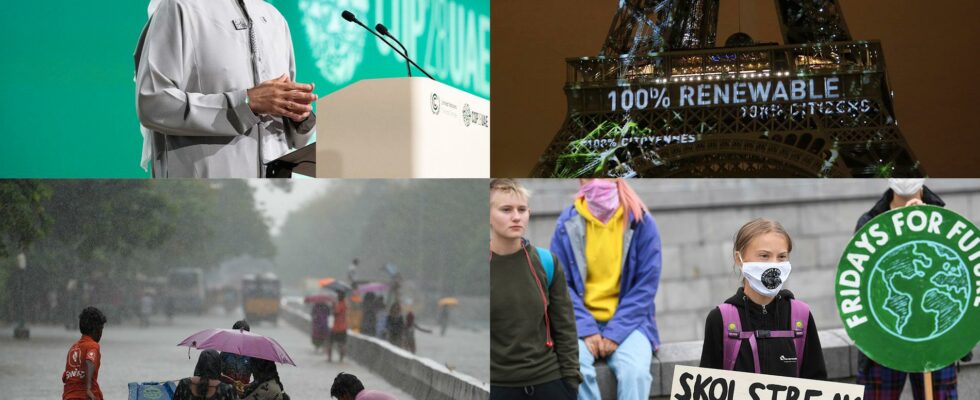unsaveSave
expand-left
full screen COP28 president Sultan al-Jaber, the Paris Agreement, natural disasters and Greta Thunberg. Archive image. Photo: Henrik Montgomery/TT, Thibault Camus/AP, Kumar A. Mahesh/AP, Fredrik Sandberg/TT
Now the countries of the world have gathered again to try to agree on new climate goals during the UN climate meeting COP29 in Baku in Azerbaijan.
The road has been lined with alarms, historic agreements, the Nobel Prize, setbacks and school strikes for the climate. Here are ten important years in the fight against global warming.
1988
Scientists warn that the earth is warming. The UN climate panel IPCC is created to investigate the matter more closely.
Two years later, the panel reports that the emissions of what are called “greenhouse gases” are increasing and can contribute to the warming of the planet. In a series of studies, evidence is accumulating that human activity such as burning coal, oil, gas and deforestation of rainforests is warming the earth.
1992
At the Rio conference, the UN climate secretariat UNFCCC is formed with the goal of reducing greenhouse gas emissions. In 1995, the first COP – “Conferences of the Parties” – is held to try to reach the goal.
1997
The Kyoto Protocol, the first global climate agreement, is being negotiated. It is a timetable for the industrialized countries to reduce emissions by an average of 5.2 percent from 1990 levels by 2012.
But in 2001, the US leaves the agreement. And emission giants such as China, India and Brazil did not have to set any binding targets.
2007
The IPCC reports that the evidence for global warming is unequivocal and that extreme weather events are likely to multiply.
In October of the same year, the climate panel is awarded the Nobel Peace Prize together with former US Vice President Al Gore, for sounding the alarm about climate change.
2009
The participants at COP15 in Copenhagen fail to agree on any new goal after 2012.
2015
In December, the countries of the world agree on a global climate agreement – the Paris Agreement. According to it, global warming must be kept well below 2 degrees compared to pre-industrial levels, with the ambition to limit it to 1.5 degrees. This must primarily be done through reduced emissions of greenhouse gases.
2018
Greta Thunberg starts skipping school on Fridays to strike outside Sweden’s Riksdag in protest against too little being done in the fight for the climate.
She inspires young people around the world to skip school on Fridays to demand more from global leaders.
2022
At the COP meeting on biodiversity in Montreal, countries commit to protecting 30 percent of the planet’s surface by 2030. The agreement has been called a Paris Agreement for nature.
2023
At COP28 in Dubai, an agreement is hammered out that is described as the beginning of the end for fossil fuels.
– It has taken us 30 years to get here, it should have happened a long time ago, said the EU’s climate director Wopke Hoekstra.
2024
The summer in the Northern Hemisphere is the hottest so far recorded. According to the EU’s climate service Copernicus, the average temperature on the earth’s surface is 16.82 degrees in August 2024.
